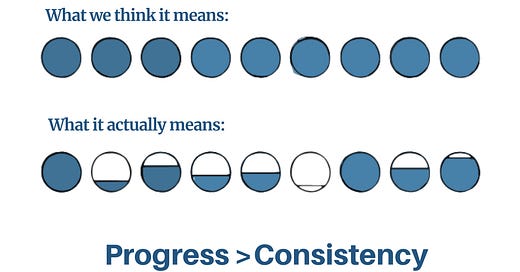📧 Why progress > consistency?
Perfectionists chase streaks. Winners track momentum. Here's how to make the switch :
Hey Ambitious,
Last Tuesday, I completely blew it.
I'd been on a 23-day streak of my morning routine – meditation, journaling, workout, the works.
Then life happened.
A client crisis at 5 AM, back-to-back meetings until 11 PM, and I fell asleep on my couch still wearing yesterday's clothes.
The old me would've thrown in the towel: "Well, the streak's broken. Might as well start fresh next Monday."
But here's what I've learned from studying the habits of people who consistently elevate their lives:
They don't win because they never fall. They win because they've mastered the art of the comeback.
The Perfection Trap That's Sabotaging Your Growth
Most high-achievers I know are secretly perfectionists. We think consistency means:
Never missing a day
Being "on" 24/7
Flawless execution every single time
But here's the counterintuitive truth:
The "all or nothing" mindset kills more dreams than lack of talent ever will.
Research from Stanford's Habit Lab shows that people who view slip-ups as "learning experiences" rather than "failures" are 67% more likely to maintain long-term behavioral changes.
The millionaires, CEOs, and top performers I've worked with?
They don't have perfect streaks.
They have perfect recoveries.
The Three Pillars of Relentless Consistency
1. Reframe Your Comeback Story
The Shift: Instead of "I failed yesterday" → "I'm collecting comeback data"
How to implement:
Every time you miss a day, ask yourself: "What can this teach me about my systems?"
Maybe you need an earlier bedtime, a simpler routine, or a backup plan for chaotic days.
Example: After missing that Tuesday, I realized I needed a "chaos day" protocol – a 5-minute version of my routine that I could do even during crisis mode.
2. Master the 24-Hour Rule
The Psychology: The longer you stay off track, the harder it becomes to restart.
Your brain starts creating stories about why you're "not the type of person who does X."
The Implementation:
Give yourself exactly 24 hours to feel bad about missing a day. Then, regardless of circumstances, take one small action toward your goal.
Real example: A client missed her workout routine for three weeks due to a family emergency.
Instead of waiting for the "perfect moment" to restart, she did five push-ups in her hotel room.
That micro-action rekindled her identity as someone who exercises.
3. Build Your Bounce-Back Muscle
The Secret: Consistency isn't about being perfect. It's about being relentless in your return.
The Practice:
Create a "comeback protocol" for your most important habits.
What's the smallest possible action you can take to get back on track?
Missed meditation? One conscious breath
Skipped reading? One paragraph
Avoided networking? One text to a contact
The compound effect: These micro-comebacks build what I call "bounce-back confidence" – the unshakeable belief that you can always return to your path.
The Data That Changes Everything
Here's what blew my mind:
A study tracking 1,000 people over two years found that those who missed fewer than 30% of their intended habit days achieved their goals 94% of the time.
Translation:
You can "fail" 109 days out of the year and still crush your goals.
You don't need 365 perfect days. You need 365 attempts to show up.
Your Next-Level Implementation Strategy
This week, try this:
Pick one habit you've been inconsistent with
Design your comeback protocol – what's the smallest action you can take to restart?
When you miss a day (notice I said "when," not "if"), implement your protocol within 24 hours
Track your bounce-backs, not just your streaks
Instead of counting perfect days, count comeback days.
Each return to your path is building your most valuable skill – resilience.
Your Comeback Starts Right Now
Remember: Your comeback is always stronger than your setback.
The most successful people I know aren't the ones who never fall off track.
They're the ones who've mastered the art of getting back on track faster than anyone else.
Every missed day is just data.
Every comeback is building your bounce-back muscle.
Every restart is proof that you're someone who doesn't quit.
Progress over perfection, always.
What's one small action you can take today to strengthen your comeback story?
Keep elevating,
~ Elevated Path
P.S. That Tuesday I mentioned?
It led to my best habit month yet.
Sometimes our greatest "failures" redirect us to our greatest breakthroughs.
Your next comeback might be your biggest leap forward.
Reply and let me know – what's your comeback story? I read every response.




